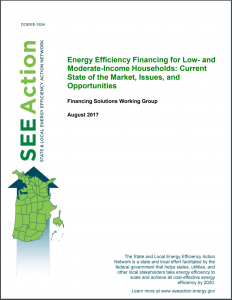Full Title: Energy Efficiency Financing for Low- and Moderate-Income Households: Current State of the Market, Issues, and Opportunities
Author(s): Greg Leventis, Chris Kramer, and Lisa Schwartz
Publisher(s): Office of Energy Efficiency and Renewable Energy (EERE)
Publication Date: August 1, 2017
Full Text: Download Resource
Description (excerpt):
Ensuring that low- and moderate-income (LMI) households have access to energy efficiency is equitable, provides energy savings as a resource to meet energy needs, and can support multiple policy goals, such as affordable energy, job creation, and improved public health. Although the need is great, many LMI households may not be able to afford efficiency improvements or may be inhibited from adopting efficiency for other reasons. Decisionmakers across the country are currently exploring the challenges and potential solutions to ramping up adoption of efficiency in LMI households. Many are exploring the use of financing as a potential tool toward meeting that goal.
This report provides an overview of energy efficiency financing programs nationwide—in both the single family (SF) and multifamily (MF) sectors—that are reaching LMI households. These households are defined in multiple ways—for example, for program qualification. For the purpose of examining sector characteristics, this report defines LMI households as those making less than 300 percent of the federal poverty level (FPL). Financing broadly refers to loans or products that enable investments in energy improvements in LMI households, which are recouped from the household over a schedule.
The report’s objective is to offer state and local policymakers, state utility regulators, program administrators, financial institutions, consumer advocates and other LMI stakeholders with an understanding of:
- The relationship between LMI communities and energy efficiency, including important considerations for its use for these households
- Lessons learned from existing energy efficiency financing programs serving LMI households
- The financing products these programs use and their relative advantages and disadvantages in addressing barriers to financing or to energy efficiency uptake for LMI households
